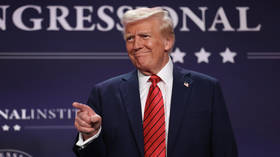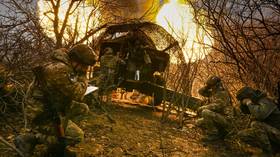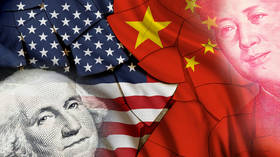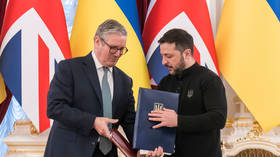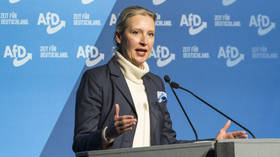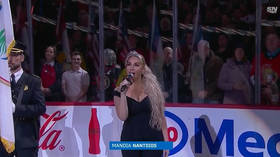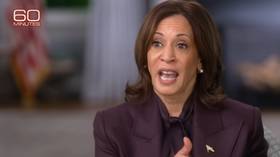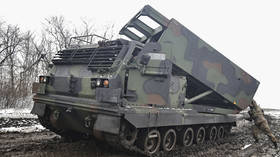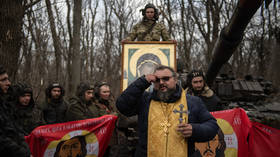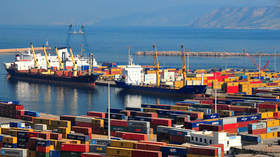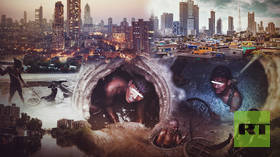Violence erupts as police & protesters clash during Australia Day in Sydney (PHOTOS, VIDEO)
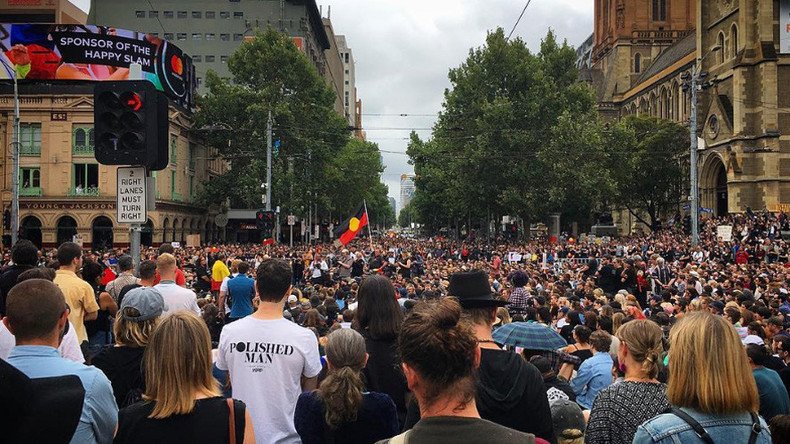
Police have cracked down on flag-burning protesters gathered in Sydney for ‘Invasion Day’ – an event to protest Australia Day, which is celebrated on January 26.
Thousands of people across Australia have joined indigenous people to protest the celebrations.
The Sydney Invasion Day rally just turned violent. pic.twitter.com/F66rQIJ292
— Allan Clarke (@AllanJClarke) January 26, 2017
The protester who initially tried to set the flag on fire, 20-year-old Indigenous Australian death metal singer Birrugan Dunn-Velasco, has been taken to the police station.
Police clash with protestors attempting to burn flag at #InvasionDay marchhttps://t.co/kX0t23by5rpic.twitter.com/dZn3emx3cg
— Simon Crerar (@simoncrerar) January 26, 2017
A woman was injured in the protest and was taken to the hospital, ABC News reported.
Protesters marched through central Sydney, calling on the government to change the date of Australia Day and chanting: “always was, always will be aboriginal land.”
Several police sprayed the crowd with substance and tackled a young man trying to set the flag on fire pic.twitter.com/0R5PVRI6XA
— Allan Clarke (@AllanJClarke) January 26, 2017
January 26 is considered a day of mourning by Aboriginal Australians. On that date in 1788, the first British ships arrived in New South Wales.
“We have been mistreated, slaughtered and beaten down since the day, so don’t expect us to be happy little Aboriginals on that day,” Ken Canning, one of the rally’s organizers, told BuzzFeed.
It's been quite the day! #InvasionDaypic.twitter.com/UMiQHgl6rN
— Allan Clarke (@AllanJClarke) January 26, 2017
Canning told a crowd that “Australians have woken up” and now realize that Australia Day is a day of mourning for Aboriginal and Torres Strait Islander people.
“That is not something to celebrate. That is not a day to throw a shrimp on the barbie. That is not a day to go out and get blind drunk and start throwing up all over the footpath,” he said, according to The Age media.
“It was an invasion. And it’s still going on today,” he added.
Indigenous elder Uncle Max Harrison, who came to a special smoking ceremony performed by Aboriginals in Sydney, expressed a milder stance, but also urged Australians to acknowledge what January 26 means for Aboriginals.
“I just hope that the public could understand and look at our cultural day within this day that they call Australia Day,” he said, as cited by ABC News.
Always was, always will be...
— Simon Crerar (@simoncrerar) January 25, 2017
Smoking Ceremony at Barangaroo #SurvivalDay#AustraliaDaypic.twitter.com/XVjrl6gTl4
Protests across the country have drawn thousands of people. The Melbourne protest is the biggest, with tens of thousands participating, witnesses say.
Melbourne Invasion Day protest crowd estimate now at 50k#changethedate#changethesystempic.twitter.com/YIAGkFnAgM
— Sally Rugg (@sallyrugg) January 26, 2017
What makes me proud to be an Aussie? 50k people in Melbourne protesting #InvasionDay on #AustraliaDay 2017#changethedatepic.twitter.com/oGDjXzQCOG
— Seano (@SeanBradbery) January 26, 2017
In Canberra, hundreds of protesters marched from the Aboriginal tent embassy to the doors of Parliament House.
The hashtags #ChangeTheDate, #InvasionDay, and #SurvivalDay have all been trending on social media.
This what our country looks like. Note the black dots that represent recorded massacres of Aboriginal people. #ChangetheDatepic.twitter.com/WWj24TIZiz
— Ryan Griffen (@RyanJGriffen) January 25, 2017
Let's #changethedate to May 8, maaaaaate. pic.twitter.com/vOrdN6X1dI
— Junkee (@junkeedotcom) January 25, 2017
It seems, however, that most Australians want their national holiday to stay on the same date. A McNair yellowSquares national poll recently found that 68 percent of Australians felt positive about January 26, 19 percent were indifferent, while seven percent had mixed feelings, compared with the Aboriginal people, 31 percent of whom felt negative, with a 30 percent having mixed feelings.
Asked if the date should be changed, 15 percent of Australians said ‘yes,’ compared to 54 percent of Aboriginals.
Australians chose “barbecue,”“celebration,” and “holiday” as key words describing January 26, while for Indigenous Australians, the three words were “invasion,”“survival,” and “murder.”



